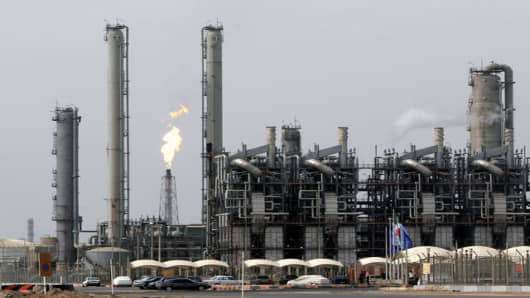Oil fell a dollar Tuesday amid intensifying worry over the health of the U.S. economy, but traders cut the market's losses after the Federal Reserve slashed interest rates by 75 basis points in a surprise move aimed at averting recession.
U.S. light, sweet crude was lower. London's Brent crude followed the move.
"The oil markets are responding to the Fed rate cut, with hopes up that it will help the economy and keep demand for oil robust," said Phil Flynn of Alaron Trading in Chicago.
World stock markets suffered their deepest losses since Sept. 11, 2001, earlier in the day amid growing signals that the fallout from the U.S. credit and housing crisis could lead to a recession.
"There's a lot of fear out there. That could make some market participants go into cash until the situation becomes clearer," said Mike Wittner of Societe Generale.
The sell-off has taken oil prices 10 percent below the all-time peak over $100 a barrel hit Jan. 3, when the market was focusing on tight inventory levels and a robust energy demand outlook.
The U.S. Energy Information Administration may have to rethink its forecasts for U.S. and global oil demand growth if a looming U.S. recession bites into energy usage, an agency analyst said on Tuesday.
"Clearly our forecasts do not assume a recession at the moment, so any recession that did occur would reduce the estimate of our demand increase both here in the U.S. and to an extent globally," EIA analyst Doug MacIntyre said. "How much, we really haven't done the quantifiable analysis yet."
Speculators Sell?
Goldman Sachs said if all speculative length were liquidated on the oil markets, prices could drop to the low $80s, but fundamentals of supply and demand would probably prevent funds from selling out completely.
"Fundamentals continue to show little sign of weakness and suggest that the recent sell-off is overdone," Goldman Sachs wrote in a note.
Inventory data in top consumer the United States last week showed the first increase in oil stocks for nine weeks, but Goldman Sachs said stores of refined products in industrialized countries were still relatively low.
Concerns about political instability in oil-producing countries like Nigeria were also expected to provide support for oil prices.
Oil's recent slide has relieved pressure on the Organization of the Petroleum Exporting Countries (OPEC) to agree a production increase when it meets on Feb. 1.
But the producer group is not expected to cut output while the world is smarting from the impact of high oil prices and economic uncertainty.
"With mounting evidence of a slowdown in U.S. economic expansion at year-end, fears of a downright recession have multiplied," OPEC said Tuesday in a monthly report.


